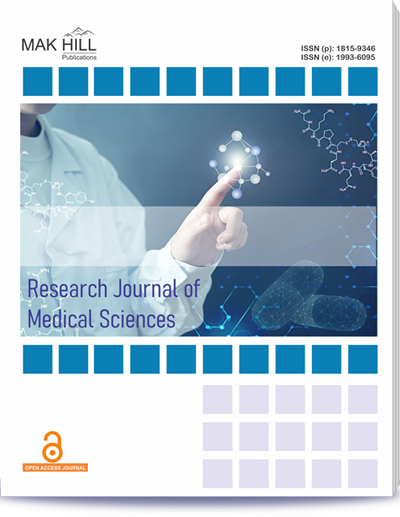
Research Journal of Medical Sciences
ISSN: Online 1993-6095ISSN: Print 1815-9346
Abstract
Sleep disturbances are a hallmark symptom of major depressive disorder (MDD), significantly affecting the quality of life and overall treatment outcomes. Insomnia, hypersomnia, fragmented sleep and altered sleep architecture are commonly reported among patients with MDD. While pharmacological interventions such as antidepressants and sedative‐hypnotics are widely used to manage sleep disturbances, non‐pharmacological therapies, including cognitive behavioral therapy for insomnia (CBT‐I), relaxation techniques and lifestyle modifications, are gaining recognition for their efficacy. This study aims to compare the effectiveness of pharmacological and non‐pharmacological interventions in improving sleep patterns among individuals diagnosed with MDD. A cross‐sectional study was conducted at Sree Mookambika Institute of Medical Sciences, involving 120 participants diagnosed with MDD, aged between 18 and 55 years. Participants were divided into two groups: one receiving pharmacological treatment (antidepressants and sedatives) and the other undergoing non‐pharmacological interventions (CBT‐I, sleep hygiene education and relaxation therapy). The Pittsburgh Sleep Quality Index (PSQI) and Insomnia Severity Index (ISI) were used to assess sleep disturbances pre‐and post‐intervention over eight weeks. Data were analyzed using paired t‐tests, ANOVA and regression analysis to evaluate treatment outcomes and statistical significance. The study is expected to demonstrate that both interventions improve sleep quality., however, non‐pharmacological methods may offer longer‐term benefits with fewer side effects. Pharmacological interventions may show rapid symptomatic relief, but issues such as dependence and residual daytime sedation could affect overall patient satisfaction. A comparative analysis of sleep efficiency, latency and subjective sleep quality will be detailed to highlight the relative advantages of each approach. Addressing sleep disturbances in MDD is crucial for comprehensive treatment. While medications remain a cornerstone, integrating non‐pharmacological interventions may provide sustainable, side‐effect‐free improvements in sleep regulation. The findings of this study may guide clinicians toward a multimodal, patient‐centered approach for managing sleep disturbances in MDD.
How to cite this article:
C. Rakesh, Sajeesh Sudarsanan and Nayana R. Nakul. Sleep Disturbances in Major Depressive Disorder: A Comparative Study of Pharmacological and Non‐Pharmacological Interventions.
DOI: https://doi.org/10.36478/10.36478/makrjms.2025.2.374.379
URL: https://www.makhillpublications.co/view-article/1815-9346/10.36478/makrjms.2025.2.374.379